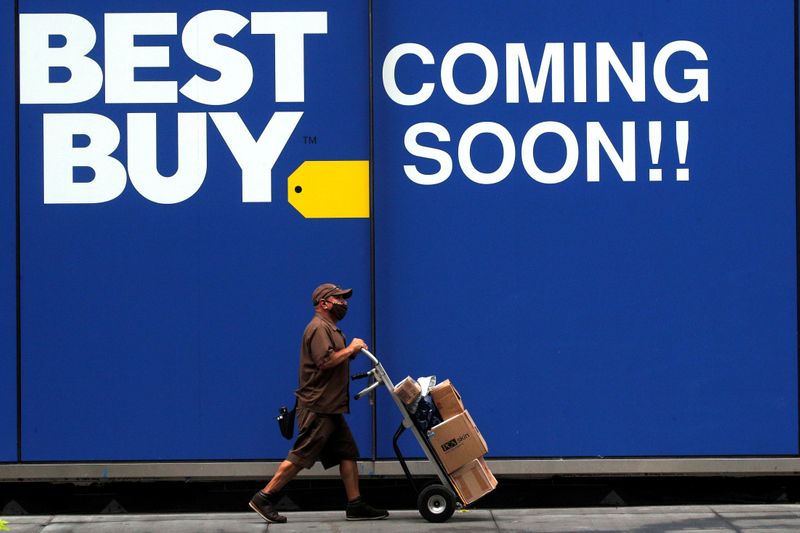Bitcoin price today: struggles at $111k as trade tensions, risk aversion weigh
Investing.com -- Shares in Best Buy (NYSE:BBY) slid 2% lower in premarket trading Thursday after the U.S. retailer slashed its outlook for fiscal 2026 (FY26) to reflect the impact of tariffs, offsetting its better-than-expected results for the first quarter.
The company posted Q1 earnings per share (EPS) of $1.15, exceeding analyst estimates of $1.07. Revenue for the quarter fell roughly 1% to $8.77 billion, just above the consensus estimate of $8.75 billion.
Enterprise comparable sales declined 0.7%, showing an improvement from the 6.1% drop a year ago but slightly missing estimates. U.S. and international comp sales both fell 0.7%, compared to steeper declines in the prior year.
Gross margin held steady at 23.4%, in line with projections and up slightly from 23.3% a year earlier.
Looking ahead, Best Buy expects full-year earnings between $6.15 and $6.30 per share, down from the previous range of $6.20 to $6.60. The new guidance compares to the consensus estimate of $6.17.
Revenue outlook was cut to the range of $41.1 billion to $41.9 billion, down from $41.4 billion to $42.2 billion, compared to the Street’s $41.4 billion view.
"Today we are updating our full year guidance to incorporate the impact of tariffs,” said Matt Bilunas, CFO of Best Buy.
"Our underlying working assumptions are that tariffs stay at the current levels for the rest of the year, and there is no material change in consumer behavior from the trends we have seen in recent quarters. As you can imagine, and based on our history, we will continue to scenario-plan and adjust with agility as the situation evolves.”
Best Buy now expects FY26 comparable sales to range between a 1.0% decline and a 1.0% increase, down from its earlier forecast of flat to 2% growth.
The company also narrowed its outlook for the adjusted operating income rate to around 4.2%, compared to the previous range of 4.2% to 4.4%.
The adjusted effective tax rate is still projected at approximately 25%. Capital spending is now estimated at about $700 million, trimmed from the earlier range of $700 million to $750 million.
For the second quarter, Best Buy said it expects comparable sales "to be slightly down to last year and our adjusted operating income rate to be approximately 3.6%."
